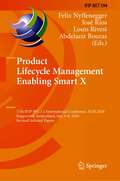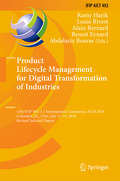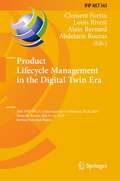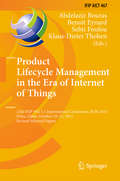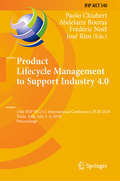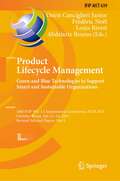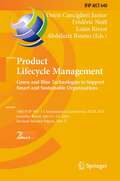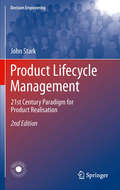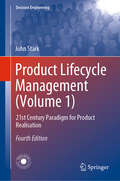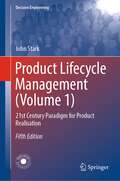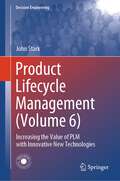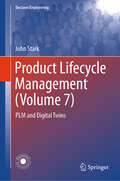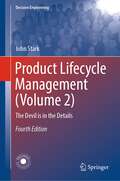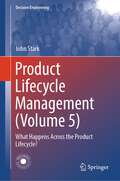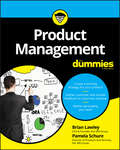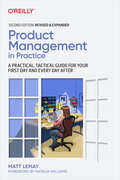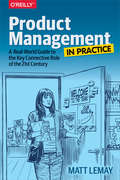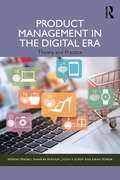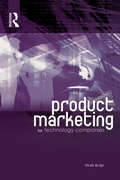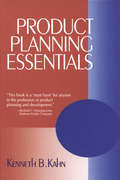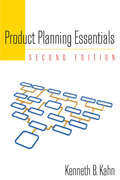- Table View
- List View
Product Lifecycle Management Enabling Smart X: 17th IFIP WG 5.1 International Conference, PLM 2020, Rapperswil, Switzerland, July 5–8, 2020, Revised Selected Papers (IFIP Advances in Information and Communication Technology #594)
by Abdelaziz Bouras Louis Rivest José Ríos Felix NyffeneggerThis book constitutes the refereed post-conference proceedings of the 17th IFIP WG 5.1 International Conference on Product Lifecycle Management, PLM 2020, held in Rapperswil, Switzerland, in July 2020. The conference was held virtually due to the COVID-19 crisis. The 60 revised full papers presented together with 2 technical industrial papers were carefully reviewed and selected from 80 submissions. The papers are organized in the following topical sections: smart factory; digital twins; Internet of Things (IoT, IIoT); analytics in the order fulfillment process; ontologies for interoperability; tools to support early design phases; new product development; business models; circular economy; maturity implementation and adoption; model based systems engineering; artificial intelligence in CAx, MBE, and PLM; building information modelling; and industrial technical contributions.
Product Lifecycle Management for Digital Transformation of Industries
by Alain Bernard Abdelaziz Bouras Benoit Eynard Ramy Harik Louis RivestThis book constitutes the refereed proceedings of the 13th IFIP WG 5. 1 International Conference on Product Lifecycle Management, PLM 2016, held in Columbia, SC, USA, in July 2016. The 57 revised full papers presented were carefully reviewed and selected from 77 submissions. The papers are organized in the following topical sections: knowledge sharing, re-use and preservation; collaborative development architectures; interoperability and systems integration; lean product development and the role of PLM; PLM and innovation; PLM tools; cloud computing and PLM tools; traceability and performance; building information modeling; big data analytics and business intelligence; information lifecycle management; industry 4. 0; metrics, standards and regulation; and product, service and systems.
Product Lifecycle Management in the Digital Twin Era: 16th IFIP WG 5.1 International Conference, PLM 2019, Moscow, Russia, July 8–12, 2019, Revised Selected Papers (IFIP Advances in Information and Communication Technology #565)
by Alain Bernard Abdelaziz Bouras Louis Rivest Clement FortinThis book constitutes the refereed post-conference proceedings of the 16th IFIP WG 5.1 International Conference on Product Lifecycle Management, PLM 2019, held in Moscow, Russia, in July 2019. The 38 revised full papers presented were carefully reviewed and selected from 63 submissions. The papers are organized in the following topical sections: 3D modelling and data structures; PLM maturity and industry 4.0; ontologies and semantics; PLM and conceptual design; knowledge and change management; IoT and PLM; integrating manufacturing realities; and integration of in-service and operation.
Product Lifecycle Management in the Era of Internet of Things
by Klaus-Dieter Thoben Abdelaziz Bouras Benoit Eynard Sebti FoufouThis book constitutes the refereed proceedings of the 12th IFIP WG 5. 1 International Conference on Product Lifecycle Management, PLM 2015, held in Doha, Qatar, in October 2015. The 79 revised full papers were carefully reviewed and selected from 130 submissions. The papers are organized in the following topical sections: smart products, assessment approaches, PLM maturity, building information modeling (BIM), languages and ontologies, product service systems, future factory, knowledge creation and management, simulation and virtual environments, sustainability and systems improvement, configuration and engineering change, education studies, cyber-physical and smart systems, design and integration issues, and PLM processes and applications.
Product Lifecycle Management to Support Industry 4.0: 15th Ifip Wg 5. 1 International Conference, Plm 2018, Turin, Italy, July 2-4, 2018, Proceedings (IFIP Advances in Information and Communication Technology #540)
by Abdelaziz Bouras José Ríos Paolo Chiabert Frédéric NoëlThis book constitutes the refereed post-conference proceedings of the 15th IFIP WG 5.1 International Conference on Product Lifecycle Management, PLM 2018, held in Turin, Spain, in July 2018.The 72 revised full papers presented were carefully reviewed and selected from 82 submissions. The papers are organized in the following topical sections: building information modeling; collaborative environments and new product development; PLM for digital factories and cyber physical systems; ontologies and data models; education in the field of industry 4.0; product-service systems and smart products; lean organization for industry 4.0; knowledge management and information sharing; PLM infrastructure and implementation; PLM maturity, implementation and adoption; 3D printing and additive manufacturing; and modular design and products and configuration and change management.
Product Lifecycle Management. Green and Blue Technologies to Support Smart and Sustainable Organizations: 18th IFIP WG 5.1 International Conference, PLM 2021, Curitiba, Brazil, July 11–14, 2021, Revised Selected Papers, Part I (IFIP Advances in Information and Communication Technology #639)
by Abdelaziz Bouras Louis Rivest Frédéric Noël Osiris Canciglieri JuniorThe two-volume set IFIP AICT 639 and 640 constitutes the refereed post-conference proceedings of the 18th IFIP WG 5.1 International Conference on Product Lifecycle Management, PLM 2021, held in Curitiba, Brazil, during July 11-14, 2021. The conference was held virtually due to the COVID-19 crisis.The 107 revised full papers presented in these proceedings were carefully reviewed and selected from 133 submissions. The papers are organized in the following topical sections: Volume I: Sustainability, sustainable development and circular economy; sustainability and information technologies and services; green and blue technologies; AI and blockchain integration with enterprise applications; PLM maturity, PLM implementation and adoption within industry 4.0; and industry 4.0 and emerging technologies: Volume II: Design, education and management; lean, design and innovation technologies; information technology models and design; and models, manufacturing and information technologies and services.
Product Lifecycle Management. Green and Blue Technologies to Support Smart and Sustainable Organizations: 18th IFIP WG 5.1 International Conference, PLM 2021, Curitiba, Brazil, July 11–14, 2021, Revised Selected Papers, Part II (IFIP Advances in Information and Communication Technology #640)
by Abdelaziz Bouras Louis Rivest Frédéric Noël Osiris Canciglieri JuniorThe two-volume set IFIP AICT 639 and 640 constitutes the refereed post-conference proceedings of the 18th IFIP WG 5.1 International Conference on Product Lifecycle Management, PLM 2021, held in Curitiba, Brazil, during July 11-14, 2021. The conference was held virtually due to the COVID-19 crisis.The 107 revised full papers presented in these proceedings were carefully reviewed and selected from 133 submissions. The papers are organized in the following topical sections: Volume I: Sustainability, sustainable development and circular economy; sustainability and information technologies and services; green and blue technologies; AI and blockchain integration with enterprise applications; PLM maturity, PLM implementation and adoption within industry 4.0; and industry 4.0 and emerging technologies: Volume II: Design, education and management; lean, design and innovation technologies; information technology models and design; and models, manufacturing and information technologies and services.
Product Lifecycle Management. PLM in Transition Times: 19th IFIP WG 5.1 International Conference, PLM 2022, Grenoble, France, July 10–13, 2022, Revised Selected Papers (IFIP Advances in Information and Communication Technology #667)
by Abdelaziz Bouras Louis Rivest Frédéric Noël Felix NyffeneggerThis book constitutes the refereed proceedings of the 19th IFIP WG 5.1 International Conference, PLM 2022, Grenoble, France, July 10–13, 2022, Revised Selected Papers.The 67 full papers included in this book were carefully reviewed and selected from 94 submissions. They were organized in topical sections as follows: Organisation: Knowledge Management, Business Models, Sustainability, End-to-End PLM, Modelling tools: Model-Based Systems Engineering, Geometric modelling, Maturity models, Digital Chain Process, Transversal Tools: Artificial Intelligence, Advanced Visualization and Interaction, Machine learning, Product development: Design Methods, Building Design, Smart Products, New Product Development, Manufacturing: Sustainable Manufacturing, Lean Manufacturing, Models for Manufacturing.
Product Lifecycle Management: 21st Century Paradigm for Product Realisation
by John StarkProduct Lifecycle Management (2nd edition) explains what Product Lifecycle Management (PLM) is, and why it's needed. It describes the environment in which products are developed, realised and supported, before looking at the basic components of PLM, such as the product, processes, applications, and people. The final part addresses the implementation of PLM, showing the steps of a project or initiative, and typical activities. This new and expanded edition of Product Lifecycle Management is fully updated to reflect the many advances made in PLM since the release of the first edition. It includes descriptions of PLM technologies and examples of implementation projects in industry. Product Lifecycle Management will broaden the reader's understanding of PLM, nurturing the skills needed to implement PLM successfully and to achieve world-class product performance across the lifecycle. "A 20-year veteran of PLM, I highly recommend this book. A clear and complete overview of PLM from definition to implementation. Everything is there - reasons, resources, strategy, implementation and PLM project management." Achim Heilmann, Manager, Global Technical Publications, Varian Medical Systems "Product Lifecycle Management is an important technology for European industry. This state-of-the art book is a reference for those implementing and researching PLM." Dr. Erastos Filos, Head of Sector "Intelligent Manufacturing Systems", European Commission "This book, written by one of the best experts in this field, is an ideal complement for PLM courses at Bachelor and Master level, as well as a well-founded reference book for practitioners." Prof. Dr.-Ing. Dr. h.c. Sandor Vajna, University of Magdeburg, Germany "This comprehensive book can help drive an understanding of PLM at all levels - from CEOs to CIOs, and from professors to students - that will help this important industry continue to expand and thrive." James Heppelmann, President and Chief Executive Officer, PTC "PLM is a mission-critical decision-making system leveraged by the world's most innovative companies to transform their process of innovation on a continuous basis. That is a powerful value proposition in a world where the challenge is to get better products to the market faster than ever before. That is the power of PLM." Tony Affuso, Chairman and CEO, Siemens PLM Software
Product Lifecycle Management: 21st Century Paradigm for Product Realisation (Decision Engineering)
by John StarkThis fourth edition of the book provides readers with a detailed explanation of PLM, enabling them to gain a full understanding and the know-how to implement PLM within their own business environment. This new and expanded edition has been fully updated to reflect the numerous technological and management advances made in PLM since the release of the third edition in 2014, including chapters on both the Internet of Things and Industry 4.0. The book describes the environment in which products are ideated, developed, manufactured, supported and retired before addressing the main components of PLM and PLM Initiatives. These include product-related business processes, product data, product data management (PDM) systems, other PLM applications, best practices, company objectives and organisation. Key activities in PLM Initiatives include Organisational Change Management (OCM) and Project Management. Lastly, it addresses the PLM Initiative, showing the typical steps and activities of a PLM project or initiative. Enhancing readers’ understanding of PLM, the book enables them to develop the skills needed to implement PLM successfully and achieve world-class product performance across the lifecycle.
Product Lifecycle Management: 21st Century Paradigm for Product Realisation (Decision Engineering)
by John StarkThis fifth edition of “Product Lifecycle Management” updates and adds to the successful fourth edition, the most frequently cited PLM publication. It gives the reader a thorough explanation of Product Lifecycle Management (PLM) and provides them with a full understanding and the skills to implement PLM within their own business environment. This new and expanded edition is fully updated to reflect the many technological and management advances made in PLM since the release of the fourth edition. “Product Lifecycle Management” will broaden the reader’s understanding of PLM, nurturing the skills needed to implement PLM successfully and to achieve world-class product performance across the lifecycle.Among the components of PLM described are product-related business processes, product data, product data management (PDM) systems, other PLM applications, best practices, company objectives and organisation. This book also describes the relationships of PLM with the Internet of Things, Industry 4.0, Digital Twins and Digital Threads. “Product Lifecycle Management” (5th edition) explains what PLM is, and why it is needed. It describes the environment in which products are ideated, developed, manufactured, supported and retired, before addressing the main components of PLM and PLM Initiatives. Key activities in PLM Initiatives described include organisational change management (OCM) and project management. The final part of the book addresses the PLM Initiative, showing the typical steps and activities of a PLM project or initiative.
Product Lifecycle Management: Increasing the Value of PLM with Innovative New Technologies (Decision Engineering)
by John StarkThis book is about the relationship between Product Lifecycle Management (PLM) and new technologies that have emerged in the early years of the twenty-first century. The technologies addressed include the Internet of Things (IoT), Artificial Intelligence (AI), Digital Thread, Digital Twins, Big Data, digital transformation, sustainable products, and Systems Engineering.Product Lifecycle Management is the business activity of managing, in the most effective way, a company’s products all the way across their lifecycles—from the very first idea for a product all the way through until it is retired and disposed of. PLM is a key technology for all manufacturing and engineering companies as it manages their products from Ideation, through Definition, Realisation, and Use to Retirement. The basics of PLM have been addressed in previous volumes in this series. Due to its wide span across a company, PLM has many interactions with other key technologies and systems. This Volume 6 of Product Lifecycle Management looks at the relationship of PLM to other technologies and strategies that have emerged in the twenty-first century and are used by manufacturing companies. The book also includes chapters addressing PLM education in different industry sectors such as mechanical engineering and electronic engineering.
Product Lifecycle Management: PLM and Digital Twins (Decision Engineering)
by John StarkThis volume addresses the convergence of three technologies that emerged in the early 21st century: Product Lifecycle Management (PLM), the Internet of Things (IoT), and Digital Twins. These are available to all manufacturing companies as their products go through the product lifecycle. This starts with Ideation, continues through Definition, Realisation and Use/Support, and ends with Retirement/Disposal. This book is the 7th volume in a series that started in 2004 with the publication of ‘Product Lifecycle Management: 21st Century Paradigm for Product Realisation’, which has become a seminal book on PLM. The first chapters of the book address the fundamentals of PLM, the IoT and Digital Twins, highlighting their value and benefits. The following chapters look at applications and advantages resulting from the convergence of the three technologies in specific phases of the product lifecycle. Digital Twin applications in these phases include decision support, design iteration acceleration, predictive analytics and maintenance, product and process documentation, product upgrades, product and manufacturing process simulation, quality assurance, remote monitoring and troubleshooting, remote sales, training, virtual prototyping, and virtual showrooms. The final chapter addresses the implementation of an integrated PLM and Digital Twin environment. The book gives the reader a broad understanding, valuable insights, and practical guidance about three important technologies and the way they are converging and evolving together. It will stimulate innovation, propel companies forward, and motivate them to succeed in an increasingly digitally connected product world.
Product Lifecycle Management: The Devil is in the Details (Decision Engineering)
by John StarkThis book moves beyond a general introduction to Product Lifecycle Management (PLM) and its basic elements to provide a more in-depth analysis of the subjects introduced in Volume 1 (Product Lifecycle Management: 21st Century Paradigm for Product Realisation). After providing insights into the emergence of PLM and the opportunities that it offers, key concepts such as the PLM Grid and the PLM Paradigm are introduced along with the 10 main components of PLM: objectives and metrics; management and organization; business processes; people; product data; PDM systems; other PLM applications; facilities and equipment; methods; and products. The book provides industry examples and best practices. This new edition updates the previous edition of this book, reflecting the growth of PLM over the past decade of business and technological change. It concludes by showing readers how to implement and use PLM successfully. It outlines the phases of a PLM Initiative: development of PLM vision and strategy; documentation of the current situation; description of future scenarios; development of implementation strategies and plans taking account of the need for Organisational Change Management; implementation and use. The main activities, tasks, methods, timing, and tools of the different phases of implementation are described. John Stark started working in product development in 1979. In the 1980s and 1990s, he worked in Computer-Aided Design/Computer-Aided Manufacturing (CAD/CAM), Engineering Data Management (EDM), Product Data Management (PDM), and Business Process Improvement. He has worked as a PLM consultant since 2001, and has experience with more than 100 companies in 20 countries across a range of manufacturing industry sectors. His PLM courses are taken throughout the world.
Product Lifecycle Management: What Happens Across the Product Lifecycle? (Decision Engineering)
by John StarkThis book explains ‘what goes on in a manufacturing company as a product goes through its lifecycle’. It describes more than 70 product-related activities that take place during the product lifecycle phases of ideation, development, production, service, and recycling. The various documents, data, working methods, and computer programs used in each activity are outlined. The book tells the story of a project carried out by a Master’s degree student in a manufacturing company to find out for the CEO exactly what happens with products across their lifecycle. Due to the storytelling approach of the book, the reader will learn, as if they are present in the company, about the activities that take place along the product lifecycle. They will see how the company is organized, what data and documents are created and used in each activity, and which applications are being used. They will see, from the interviews carried out by the student, what people are doing, the difficulties they face, and the improvement opportunities they see. This will give them a good understanding of the various activities that take place, and provide a basis for improving performance and implementing new processes and applications.
Product Management For Dummies
by Brian Lawley Pamela SchureYour one-stop guide to becoming a product management prodigy Product management plays a pivotal role in organizations. In fact, it's now considered the fourth most important title in corporate America—yet only a tiny fraction of product managers have been trained for this vital position. If you're one of the hundreds of thousands of people who hold this essential job—or simply aspire to break into a new role—Product Management For Dummies gives you the tools to increase your skill level and manage products like a pro. From defining what product management is—and isn't—to exploring the rising importance of product management in the corporate world, this friendly and accessible guide quickly gets you up to speed on everything it takes to thrive in this growing field. It offers plain-English explanations of the product life cycle, market research, competitive analysis, market and pricing strategy, product roadmaps, the people skills it takes to effectively influence and negotiate, and so much more. Create a winning strategy for your product Gather and analyze customer and market feedback Prioritize and convey requirements to engineering teams effectively Maximize revenues and profitability Product managers are responsible for so much more than meets the eye—and this friendly, authoritative guide lifts the curtain on what it takes to succeed.
Product Management in Practice: A Practical, Tactical Guide for Your First Day and Every Day After
by Matt LeMayProduct management has become a critical function for modern organizations, from small startups to corporate enterprises. And yet, the day-to-day work of product management remains largely misunderstood. In theory, product managers are high-flying visionaries who build products that people love. In practice, they're hard-working facilitators who bring clarity and focus to their teams.In this thoroughly revised and expanded edition, Matt LeMay provides real-world guidance for current and aspiring product managers. Updated for the era of remote and hybrid work, this book provides actionable answers to product management's most persistent and confounding questions, starting with: What exactly am I supposed to do all day?With this book, you'll learn:What the day-to-day work of product management entails--and how to excel at itWhy no job title or description will resolve the ambiguity of your roleHow to bridge the false dichotomy between "strategy" and "execution"Why the temptation to focus on decks and documentation can be bad for your team (and for you)How to prioritize your time and pick your battles
Product Management in Practice: A Real-World Guide to the Key Connective Role of the 21st Century
by Matt LeMayProduct management has become a critical connective role for modern organizations, from small technology startups to global corporate enterprises. And yet the day-to-day work of product management remains largely misunderstood. In theory, product management is about building products that people love. The real-world practice of product management is often about difficult conversations, practical compromises, and hard-won incremental gains.In this book, author Matt LeMay focuses on the CORE connective skills—communication, organization, research, execution—that can build a successful product management practice across industries, organizations, teams, and toolsets.For current and would-be product managers, this book explores:Real-world tactics for facilitating collaboration and communicationHow to talk to users and work with executivesThe importance of setting clear and actionable goalsUsing roadmaps to connect and align your teamA values-first approach to implementing Agile practicesStories that convey realities of product management in the fieldCommon behavioral traps that turn good product managers bad
Product Management in the Digital Era: Theory and Practice
by Srinivas Pingali Shankar Prakash Kiran Pedada Jyothi R KoremConsumer and industrial products have evolved significantly over the last century, from physical to virtual products, services, and hybrid products. Product management has had to change and adapt to the rapidly changing business environments. This textbook offers an in-depth look into the role, what the job entails, and what skills it requires.Product managers are required to manage the ideation, development, production, marketing, and distribution of a product. This book: highlights the content and skills required to be an effective product manager including strategy, marketing management, technology, project management, and design; provides frameworks for developing and executing effective strategies throughout the life cycle of a product with the help of case studies and examples; highlights the unique considerations and processes underpinning digital product creation; and explores marketing strategies including various channels for digital marketing and how product managers can use these effectively. Detailed and lucid, this book will be of interest to teachers and students of product management, brand management, management, and business studies.
Product Marketing for Technology Companies
by Mark ButjeThe author compresses his twenty years of experience to take a step-by-step approach to the product life-cycle, and covers areas such as:* selecting target markets* creating a positioning statement* writing a financial paragraph* motivating othersthereby demonstrating how to act as a bridge between sales, development and finance.Successfully marketing products for technology companies requires the application of precision marketing techniques, and in this book the author teaches how to focus on the whole product and create real solutions that match the market needs.
Product Planning Essentials
by Kenneth B. KahnConcise yet comprehensive, Product Planning Essentials addresses the complex, interdisciplinary nature of product development and product management. It covers strategic issues that emerge during the product life cycle, including identifying opportunities, idea generation and evaluation, technical development, commercialization, and eventual product dismissal. Special topics include public policy, international issues, and intellectual property. An interesting summary of product development best practices from several companies appears at the end of the book. Instructors, students and practitioners will appreciate the balanced managerial and how-to orientation.
Product Planning Essentials
by Kenneth B. KahnConcise yet comprehensive, Product Planning Essentials, Second Edition, addresses the complex, interdisciplinary nature of product development and product management. It covers strategic issues that emerge during the product life cycle, including identifying opportunities, idea generation and evaluation, technical development, commercialization, and eventual product dismissal. Instructors, students, and practitioners will appreciate the balanced managerial and how-to orientation. Changes to the Second Edition • Addition of two chapters on design and legal considerations. • Expanded discussion of global considerations to introduce sustainable product development and Base of the Pyramid (BoP) product development. • Simplified technical discussions of planning techniques for improved comprehension. • Inclusion of product planning best practices from recent noteworthy cases and studies in the final chapter.
